Politics and economics cannot go hand in hand, says Afghan delegate
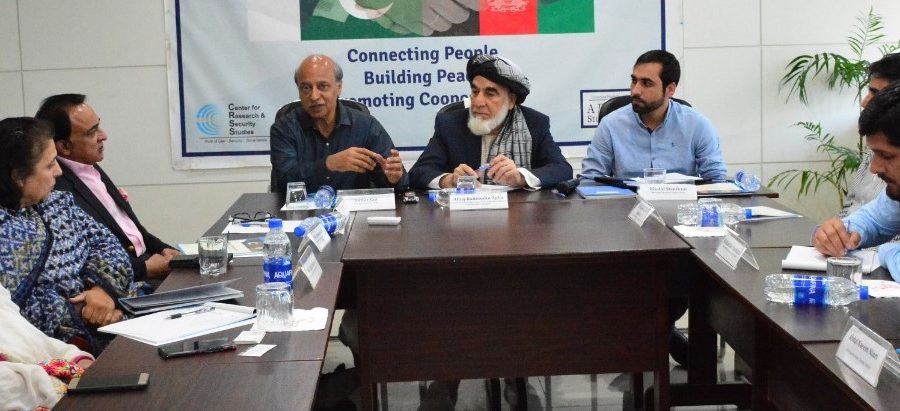
ISLAMABAD, APR 16 (DNA) – Lingual, cultural, geographical proximities demand that Pakistani and Afghan businessmen and civil society join hands, while persuading officials from both sides to facilitate economic activity across the border.
“Let’s get start working together to carve out a better future for the coming generation”. Politics and economics cannot go hand in hand.
Traders and businessmen are not and must not be political at all, as is the practice in the rest of the world, stated Noor Agha Ebrahimee, heading the visiting 8-member Afghan Delegation of Trade and Commerce, for different economic engagements across Pakistan. He was speaking to a round-table discussion on “Pak-Afghan Bilateral Trade and Future Developments’ organized by Center for Research and Security Studies (CRSS), Islamabad.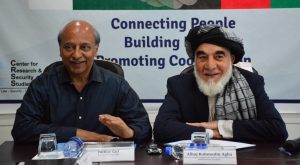
As a saying goes in Pashto ‘love increases with visits and counter-visits, so sometimes you visit and sometimes I will visit you, my beloved’. Noor Agha stated that the relationship between Pakistan and Afghanistan is multidimensional. It is not just the relationship of two neighbors, but of a common history, culture, language, interests, and many other commonalities, he added.
Moreover, Afghan delegation discussed the problems of customs valuation, bonded carriers, regulatory duty, high transit fee, quarantine and visa issues faced by Afghan businessmen amid their engagement with Pakistan. Some argued that this also negatively impact Pakistan’s trade figures as well; as Afghan traders then look for other options, where they are facilitated more in comparison to Pakistan. Whereas, the both know that Afghanistan and Pakistan are best markets for each otherin every aspect.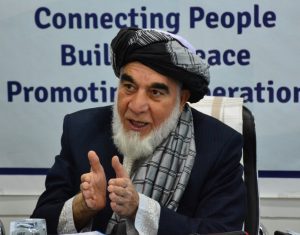
Earlier the delegation met with the officials from Pakistan Ministry of Foreign Affairs (MoFA). According to the Afghan delegation,Pakistani officials stated that the Ministry is working vigorously to resolve the impediments from Pakistan side. They also asked the Afghan delegation to propose some solid recommendations in this regard, so that tangible solutions can be sought as soon as possible.
Ms. Rizwana Asif, President Islamabad Women Chamber of Commerce and Industry (IWCCI) was pleased to know that Afghanistan also has its counterpart organization. She offered the Afghan delegation that she would be glad to host Afghan businesswomen and traders, to which visiting Afghan delegation nodded in positive, enthusiastically and also proposed expansion of this process in a bid to convene similar trade related meetings.
Likewise, Khalid Stanikzai, Managing Director Bright Business Complex, Kabul, also welcomed Pakistani investors in Afghanistan to set-up factories or industries there, whether on the basis of sole proprietorship or in partnership with Afghan businessmen. He assured that Afghan trade groups, networks etc. would take care and assist Pakistanis regarding legal issues on the Afghan soil.
Mr. Irum Mumtaz, representing Rawalpindi Women Chambers and Commerce and Industry, stated that first there is a need for more networking, information sharing, and bridging the supply and demand side of the trade. Afterwards, these networks can be consolidated across the border to build trust and improve bilateral trade relations.
In conclusion, Afghan delegation thanked CRSS for its concerted efforts and organizing such roundtables regularly, where Afghan and Pakistani traders sit across, discuss issues, come up with recommendations and propose these to their respective governments. The outcome may not be excellent, thought incremental change does happen, paving way for progressive future, but one step at a time.
Related News
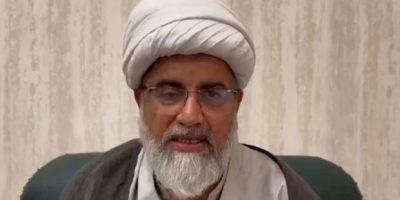
Treasury, opposition agree on Nasir Abbas as Senate opposition leader
ISLAMABAD, JAN 19: The treasury and opposition benches have agreed on the name of MajlisRead More
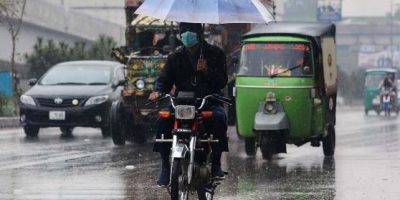
Rain, snowfall ahead, alert issued across Punjab
RAWALPINDI, 19 JAN (DNA) — The Provincial Disaster Management Authority (PDMA), Punjab has issued a high alertRead More


Comments are Closed